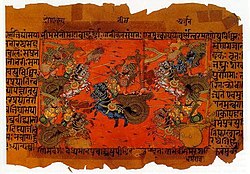Dhrishtaketu (Sanskrit: धृष्टकेतु) was a king of the Chedi kingdom and the eldest son of Shishupala, a character in the ancient Indian epic Mahabharata. He plays a major role in the Kurukshetra War, where he served as one of the seven commanders of the Pandavas' army.[1]
Etymology and epithets
According to the Monier-Williams, the name Dhṛṣṭaketu (Sanskrit: धृष्टकेतु) is a compound word derived from the Sanskrit roots dhṛṣṭa (धृष्ट)—meaning "bold," "audacious," or "courageous—and ketu (केतु)—"flag," "banner," or "emblem". Dhrishtaketu shares this name with various other figures including a son of Dhrishtadyumna.[2]
Throughout the Mahabharata, Vyasa refers to Dhrishtaketu by various epithets:[3]
- Caidya (descendant of the Chedi dynasty)
- Cedija (born in the Chedi clan)
- Cedipati (lord of the Chedis)
- Cedipungava (distinguished among the Chedis)
- Cedirat (king of the Chedis)
- Shaishupali (son of Shishupala)
- Shishupalatmaja (son of Shishupala)
Biography
According to the Adi Parva (Chapter 67, Stanza 7), Dhrishtaketu was considered to be the rebirth of Anuhlada, the son of the demon king Hiranyakashipu.[3] Dhrishtaketu was born to Shishupala, who belonged to Dasharha clan descending from Yadu from his maternal side.[4] After the death of Shishupala at the Pandava Yudhishthira's Rajasuya, narrated in Sabhā Parva, Dhrishtaketu succeeded him as the king of Chedi. Following the death of his father, Dhrishtaketu became a tributary king under the Pandavas. This alliance reflects the Chedi kingdom’s political alignment during the Kurukshetra War. Dhrishtaketu was also related to Karenumati, who married the fourth Pandava, Nakula. According to few scholars, Karenumati was his sister,[3] while others state her as his daughter.[5][1]
Dhrishtaketu played a crucial role in the Kurukshetra War, fighting on the side of the Pandavas. According to the Udyoga Parva, he contributed an akshauhini division to their army (an akshauhini consisted of 21,870 elephants, 21,870 chariots, 65,610 horses, and 109,350 infantry).[3] He was a great bowman and a Maharatha (a great chariot-warrior) as per the rating of Bhishma (Chapter 172).[6] One of his sons also took part in the war.
He was appointed one of the seven commanders-in-chief of Yudhishthira’s forces. During the war, Dhrishtaketu engaged in combat with several formidable warriors, including with Bahlika on the first day of the battle. He also fought Bhurishravas, Paurava, Kripa (the teacher of the Kuru princes) and Ambashtha. Dhrishtaketu also killed a warrior named Viradhanva during the war. However, his own life ended in battle when he fought against Drona, the commander-in-chief of the Kauravas, and was slain by him (Drona Parva, Chapter 125, Stanza 23).[3]
In the Stri Parva, his death is mourned by the women of his household, including his wives, who grieve over his lifeless body.[1] According to Ashramavasika Parva, after his death, Dhrishtaketu's spirit, along with those of other warriors who had perished in the war, was evoked by Vyasa to the surface of the Ganges (, Chapter 33, Stanza 11). His spirit was among those who received posthumous rites. In the Svargarohana Parva, it is mentioned that Dhrishtaketu attained the status of a Vishvadeva in heaven after his death.[3][7]
References
- ^ a b c Buitenen, Johannes Adrianus Bernardus; Fitzgerald, James L. (1973). The Mahabharata, Volume 7: Book 11: The Book of the Women Book 12: The Book of Peace, Part 1. University of Chicago Press. ISBN 978-0-226-25250-6.
- ^ www.wisdomlib.org (2012-06-29). "Dhrishtaketu, Dhrishta-ketu, Dhṛṣṭaketu: 11 definitions". www.wisdomlib.org. Retrieved 2025-03-29.
- ^ a b c d e f Mani, Vettam (2015-01-01). Puranic Encyclopedia: A Comprehensive Work with Special Reference to the Epic and Puranic Literature. Motilal Banarsidass. ISBN 978-81-208-0597-2.
- ^ Buitenen, Johannes Adrianus Bernardus; Fitzgerald, James L. (1973). The Mahabharata, Volume 7: Book 11: The Book of the Women Book 12: The Book of Peace, Part 1. University of Chicago Press. ISBN 978-0-226-25250-6.
- ^ Chakravarti, Bishnupada (2007-11-13). Penguin Companion to the Mahabharata. Penguin UK. ISBN 978-93-5214-170-8.
- ^ www.wisdomlib.org (2020-04-01). "Section CLXXII [Mahabharata, English]". www.wisdomlib.org. Retrieved 2025-03-29.
- ^ www.wisdomlib.org (2020-12-12). "Section CXXIV [Mahabharata, English]". www.wisdomlib.org. Retrieved 2025-03-29.









